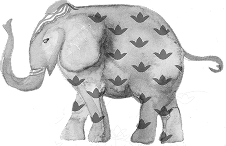Aesthetic India
Take Raul Rai. After 18 years working in investment banking in New York and London, Rai moved to Mumbai to work in private equity and to be with his wife Simran Lal, CEO of Good Earth, a homegrown luxury retailer with 10 stores across India and Turkey. Over the next few years, the MBA from Harvard Business School was gradually drawn into her family business, first as an informal advisor and then in an active role setting up Good Earth’s online business.
Finally, three years ago, the couple decided to develop a whole new line of clothing and lifestyle goods with an Indian soul and a global appeal. “Good Earth meets Silicon Valley,” is how Rai describes the new range, Nicobar, which was launched in March 2016. With clothing making up almost 70% of their product range, Nicobar is characterized by its neutral colours, quintessentially Indian fabrics such as cotton and mulmul, and clean silhouettes that make for versatile separates.
The affordable-luxury label has an omni-channel retail model with a high emphasis on digital integration. Experienced in-house web developers work closely with the product designers headed by Lal to ensure a consistent voice from conception to point of sale. Their interactive and highly visual social media emphasizes the brand’s Indian roots, laid-back, fluid vibe and international pertinence. “We’re taking a long-term view. It’s about creating a modern Indian sensibility in a borderless world,” explains the 48-year-old Rai, who is a Baker Scholar.
With a 100-strong team and three stores across India — five more are slated for this year — the new brand is looking at creating an ecosystem around ‘India Modern’. They host free events in their stores and offices for music and art communities such as Sofar and Kommune, and run a magazine and blog Nico Journal featuring others who fit into the new sensibility. They also have design collaborations with likeminded industry leaders. Notable among them is Suket Dhir.
The winner of the prestigious Woolmark Prize 2016, Dhir is considered one of the pioneers of the new ‘chilled out’, earthy, comfort-centric vibe in Indian menswear. Born into a family of fabric traders in Punjab, he developed a love for Indian textiles at a young age, and after studying at National Institute of Fashion Technology (NIFT), started to apply modern production techniques to old ways of weaving cotton, silk, linen and wool — fabrics that ‘breathe’. “I love variation techniques. I have been experimenting with extraction directly from fields, so that the fabric is longer, more durable and finer,” says the Delhi-based designer, whose unpretentious yet luxurious menswear now retails internationally from prestigious boutiques that specialize in handcrafted clothing.
He describes Nicobar as democratic and his own label Suketdhir as indulgent, since it is marked by ‘slow fashion’ methods, intense research and development, and investment on sustainable production processes rather than larger quantities. “My fabrics take years to develop; I cannot democratize that process. But I am glad we have a brand like Nicobar now so that the message of India can be taken to greater audiences. Both have their place.” Conversations with the 37-year-old are dotted by his appreciation for all things Indian: “I feel so blessed to be born in this country.”


















 GET IN TOUCH
GET IN TOUCH